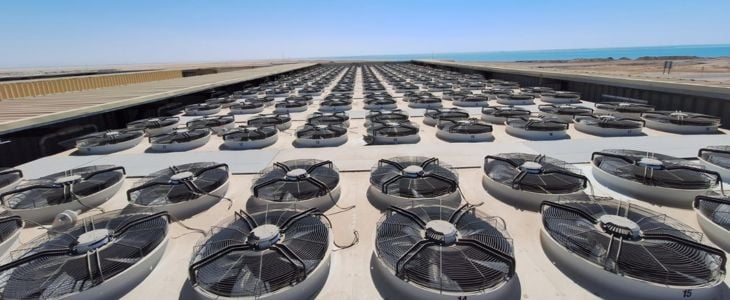The Red Sea Development, often referred to as the "Saudi Maldives," is a luxury tourism project underway on a group of islands along the Red Sea Coast of Saudi Arabia. It is renowned for its pristine, turquoise-colored seawater and is home to several hotels featuring water villas. The resort boasts incredible marine life, including coral reefs and diverse fish species, making it a haven for diving enthusiasts.
Upon completion of its first phase in 2024, the entire project will comprise approximately 50 hotels with 8,000 rooms and over 1,000 residential properties. The goal is to attract around one million tourists annually by 2030, positioning it as a sought-after destination.
Sustainability initiatives
Sustainability is a cornerstone of the Red Sea Global project, with a focus on eco-friendly practices. Key measures include sourcing all electricity from renewable sources such as solar and wind, minimizing water usage, prohibiting the discharge of contaminated water into the sea, and considering District Cooling as the most sustainable technology for cooling energy production.
These principles extend to the District Cooling Plant, which has been designed with high-efficiency dry-cooled systems boasting zero water consumption.
Challenges and solutions
The extreme weather conditions in the area, with temperatures exceeding 45 ºC during summer, posed a challenge for providing cooling energy to hotels and resorts. District Cooling was chosen due to its sustainability, efficiency and reliability. However, the scarcity of water in the arid region presented a significant hurdle.
To address this, at ARANER, we opted for dry-cooled technology with zero water consumption. Specialized dry coolers, using marine-grade aluminum to resist corrosion, were selected to ensure longevity and environmental compatibility.
The use of magnetic bearing compressors enhances efficiency and simplifies chiller maintenance by eliminating the need for oil in the system. Additionally, the adoption of direct condensation technology contributes to a 12% energy saving compared to traditional systems with an intermediate water cycle.
Innovative Thermal Energy Storage
Our solution includes a massive thermal energy storage system designed to maximize the use of solar energy. During the day, chillers run on solar power, producing more refrigeration energy than required. Excess energy is stored in a thermal energy storage tank and utilized during the night, reducing energy consumption by 15%. This innovation avoids the need for expensive electrical batteries, resulting in significant cost savings.

Project execution
We collaborated with international consultants, including ILF and Afry Energy, to optimize the District Cooling system. Detailed 3D modeling using BIM technology and Computational Fluid Dynamics (CFD) analysis ensured the correct performance of dry coolers. Magnetic bearing chillers, manufactured and tested in Korea, were integrated into the system.
A fully integrated control system, designed for unmanned operation, ensures efficient plant management, leading to substantial savings in Operation and Maintenance costs. Rigorous quality assurance measures, including Inspection and Test Plans, were implemented during the project's course.
ARANER's achievements
The Red Sea Global District Cooling plant stands out as the most efficient in the GCC area with zero water consumption. Notable achievements include a total chiller capacity of 32,500 TR, 30% electrical savings compared to other dry-cooled plants, and water savings of 1.4 million liters annually. The plant operates with a noise level of 50 dB, adhering to strict environmental standards, and is fully powered by renewable energy.
Magnetic bearings and direct condensation
Magnetic bearings, a hallmark of modern chillers, reduce energy consumption and eliminate oil-related issues. Direct condensation technology, widely used in the refrigeration industry, enhances efficiency by condensing refrigerant directly on the heat rejection device. This eliminates the need for cooling water pumps and increases the overall efficiency of the heat exchange process.
In conclusion, the Red Sea Global project not only addresses the challenges posed by extreme weather and water scarcity but also sets new benchmarks for eco-friendly luxury tourism developments. ARANER's achievements in creating an efficient and environmentally responsible District Cooling plant contribute to the overall success of the Red Sea Development, establishing a model for sustainable tourism in arid regions.










